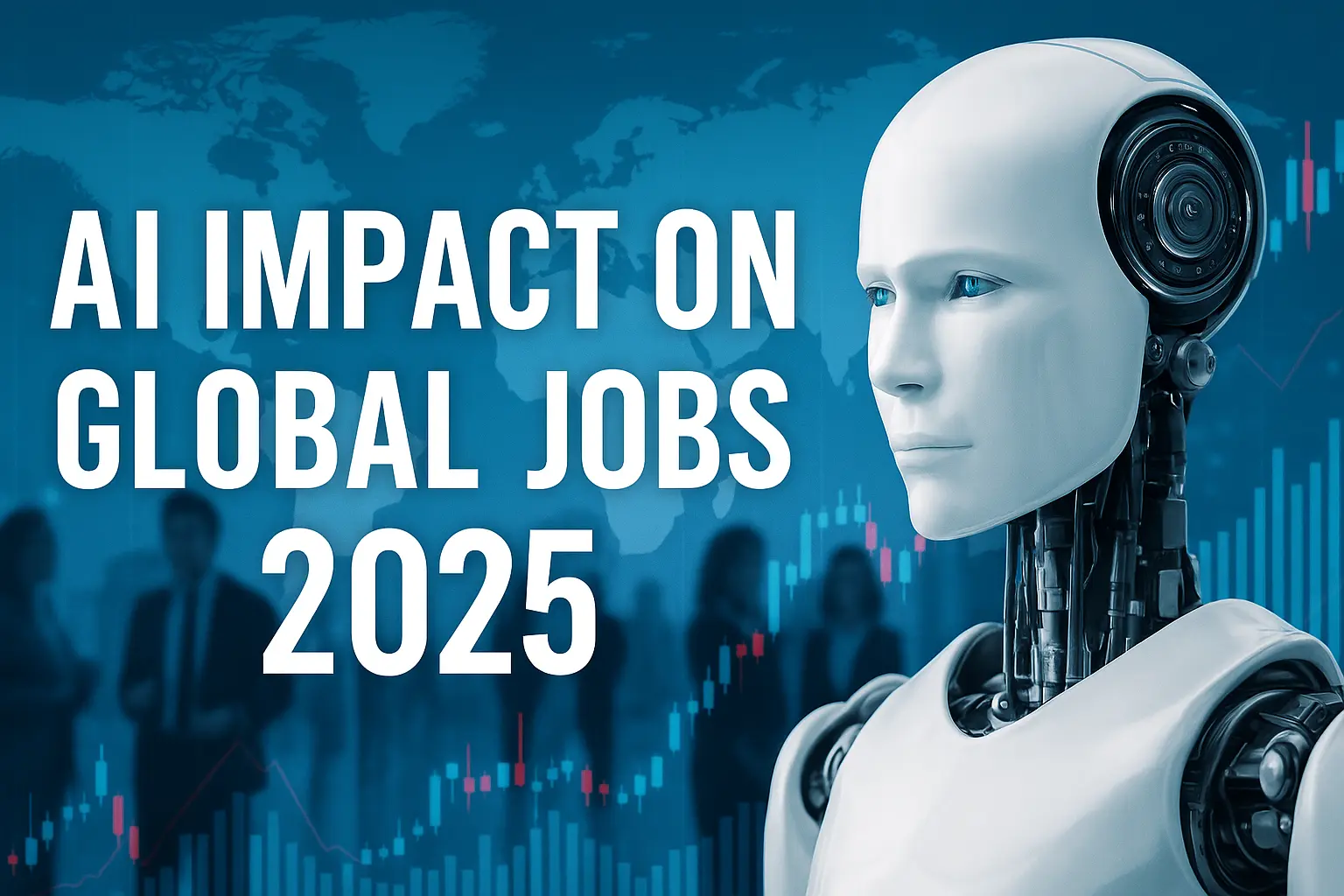The AI impact on global jobs 2025 is no longer a theoretical discussion—it’s a measurable reality. In July 2025 alone, over 10,000 jobs in the United States were lost directly due to AI, ranking it among the top five causes of layoffs this year. At the same time, the U.S. economy added just 73,000 new jobs, well below expectations, signaling a slower pace of employment growth.
According to the World Economic Forum’s Future of Jobs report, by 2030, AI could displace 92 million jobs but create 170 million new ones worldwide. This paradox means AI is not just a destroyer of jobs—it’s also a creator of entirely new opportunities. However, those opportunities won’t be evenly distributed, and they will require different skills and career strategies than traditional roles.
AI as a Job Disruptor in 2025
Automation and Generative AI at the Forefront
AI—particularly generative AI—has matured into a powerful disruptor, capable of replacing not just repetitive manual labor but also routine cognitive work. From customer service chatbots to AI-powered code generation, the technology now handles tasks once performed by entry-level and mid-level professionals.
The most affected roles tend to be those easily codified and scaled—data entry, administrative support, basic legal review, and even certain programming jobs. This rapid adoption explains why AI-related layoffs are spiking, even in technology-driven economies.
(See also: Jobs of the Future: What AI Can’t Replace (Yet))
The Numbers Tell a Story
In July 2025, 10,000+ U.S. jobs were lost to AI automation, marking one of the highest monthly AI-related displacement rates ever recorded. For comparison, AI didn’t even make the top ten causes of layoffs five years ago.
At the same time, AI-related job postings are surging. Over the past two years, there’s been a 400% increase in job descriptions requiring AI skills, indicating that while old roles vanish, new ones emerge. The challenge lies in the transition—most displaced workers lack the specialized training to step directly into these new opportunities.
Generational Impact: The Gen Z Challenge
For Gen Z entering the workforce, the changes are particularly stark. Traditional entry-level corporate job postings are down 15% year-over-year, making it harder for young workers to get their foot in the door.
Historically, these entry-level roles provided the foundation for career development. With AI now automating many of these starting tasks—like report generation, scheduling, and basic analytics—the very structure of career progression is being rewritten.
The Global Ripple Effect
India’s IT Sector in Transition
India, one of the world’s largest tech talent exporters, is feeling the pressure. Its IT sector—a cornerstone of the national economy—is facing layoffs tied directly to AI adoption. With fewer outsourcing contracts for routine coding and testing, companies are restructuring their workforces toward high-value, AI-integrated services.
This shift is not isolated. Countries reliant on tech outsourcing, from the Philippines to Eastern Europe, are grappling with similar challenges as their competitive advantage erodes in the face of AI efficiencies.
A Tale of Two Futures: Displacement vs. Creation
Jobs Lost
AI is already displacing roles across industries—customer support, logistics coordination, accounting, and more. The World Economic Forum estimates that by 2030, 92 million jobs will be gone, many of them in sectors once thought immune to automation.
Jobs Created
On the flip side, AI is generating new opportunities in fields like AI ethics, data governance, algorithm auditing, prompt engineering, and AI-powered product design. These jobs often pay more but require specialized skill sets that current education systems are only starting to address.
Looking to Hire Fast?
Hiring managers can now post jobs for free on WhatJobs and connect with millions of jobseekers.
👉 Post a Job Now →Reskilling: The Only Sustainable Strategy
If the AI impact on global jobs 2025 teaches us anything, it’s that adaptation is survival. Workers need to invest in continuous learning—not just to remain employable but to thrive in the AI economy.
High-Demand Skills for the AI Era
- AI literacy and machine learning fundamentals.
- Data analytics and visualization.
- Cybersecurity in AI environments.
- Cross-disciplinary knowledge (e.g., AI in healthcare, fintech, manufacturing).
Many of these can be developed through affordable online programs, mentorships, and project-based learning rather than formal degrees alone.
The Role of Policy and Corporate Responsibility
Governments and corporations have a shared responsibility to ensure that AI adoption does not lead to mass unemployment without recourse. Policy measures—such as subsidized retraining programs and AI transition funds—could mitigate the worst effects.
Corporations can also create structured upskilling programs for existing employees, ensuring they transition into new AI-integrated roles instead of being replaced outright.
Conclusion: Navigating the AI Economy
The AI impact on global jobs 2025 is complex—it’s simultaneously destructive and generative. While millions of roles are at risk, millions more could emerge. The decisive factor will be how quickly and effectively individuals, institutions, and governments adapt.
This is not a story of inevitable loss, but of strategic transformation. Those who embrace lifelong learning, adaptability, and cross-disciplinary expertise will find themselves well-positioned for the AI-driven future. Those who resist change risk being left behind.
FAQ – AI Impact on Global Jobs 2025
Q1: What is the AI impact on global jobs 2025?
AI is both displacing and creating jobs worldwide. In July 2025, over 10,000 U.S. jobs were lost due to AI, but demand for AI-related skills is rising sharply.
Q2: How will AI impact younger workers in 2025?
Gen Z faces fewer entry-level opportunities, with a 15% decline in postings for traditional corporate roles, making reskilling essential for career entry.
Q3: Which countries are most affected by the AI impact on global jobs 2025?
The U.S., India, and countries reliant on tech outsourcing like the Philippines are seeing significant job shifts due to AI automation.
Q4: Can the AI impact on global jobs 2025 create more jobs than it destroys?
Yes—by 2030, AI is projected to displace 92 million jobs but create 170 million new ones. Success depends on widespread reskilling and adaptation.




